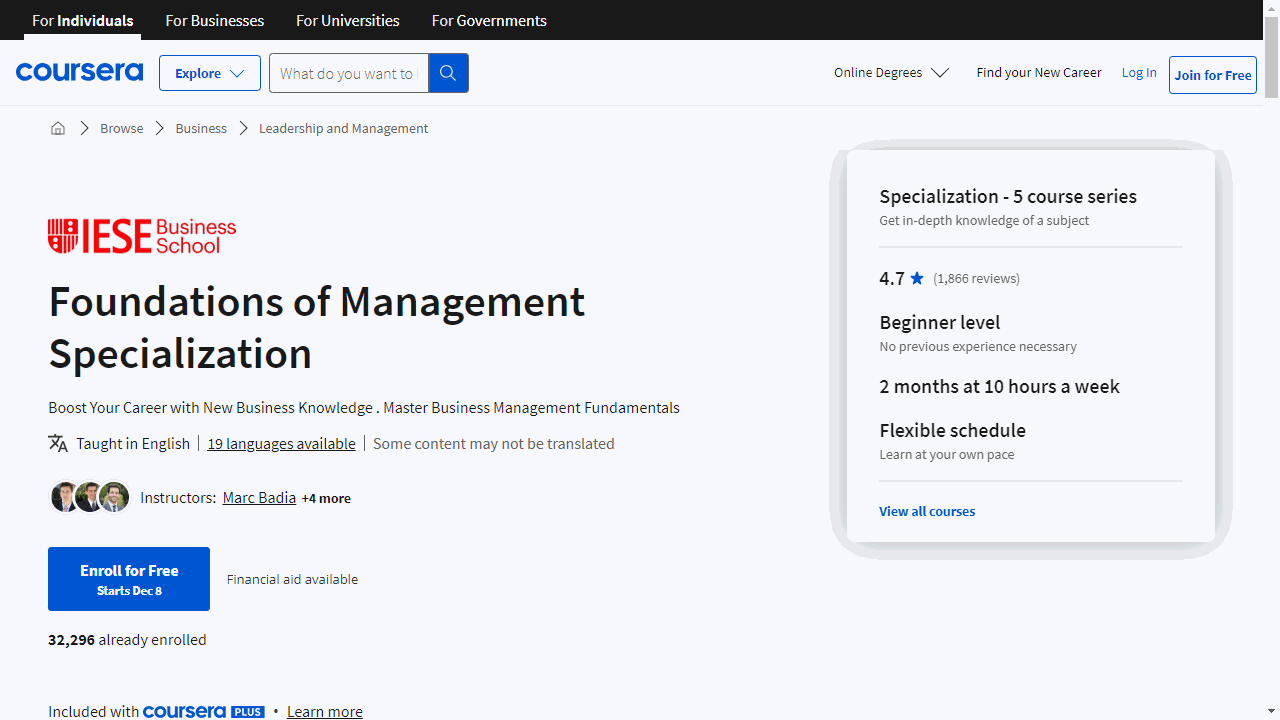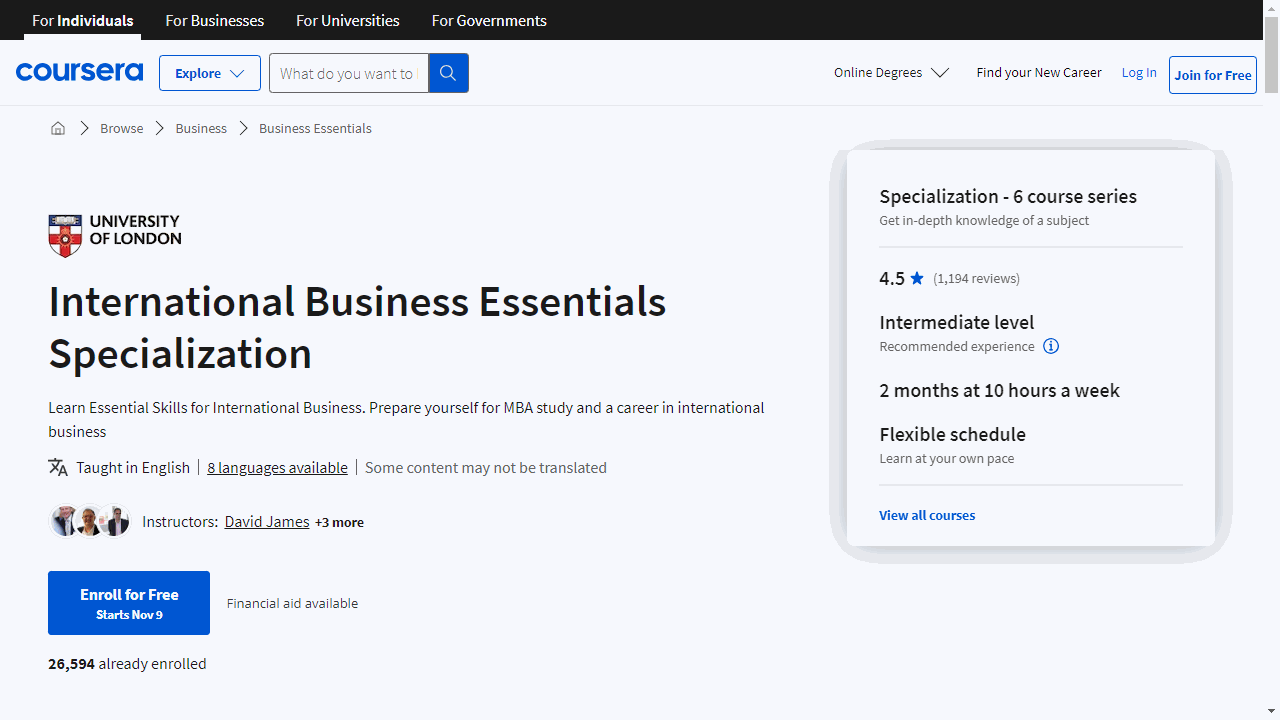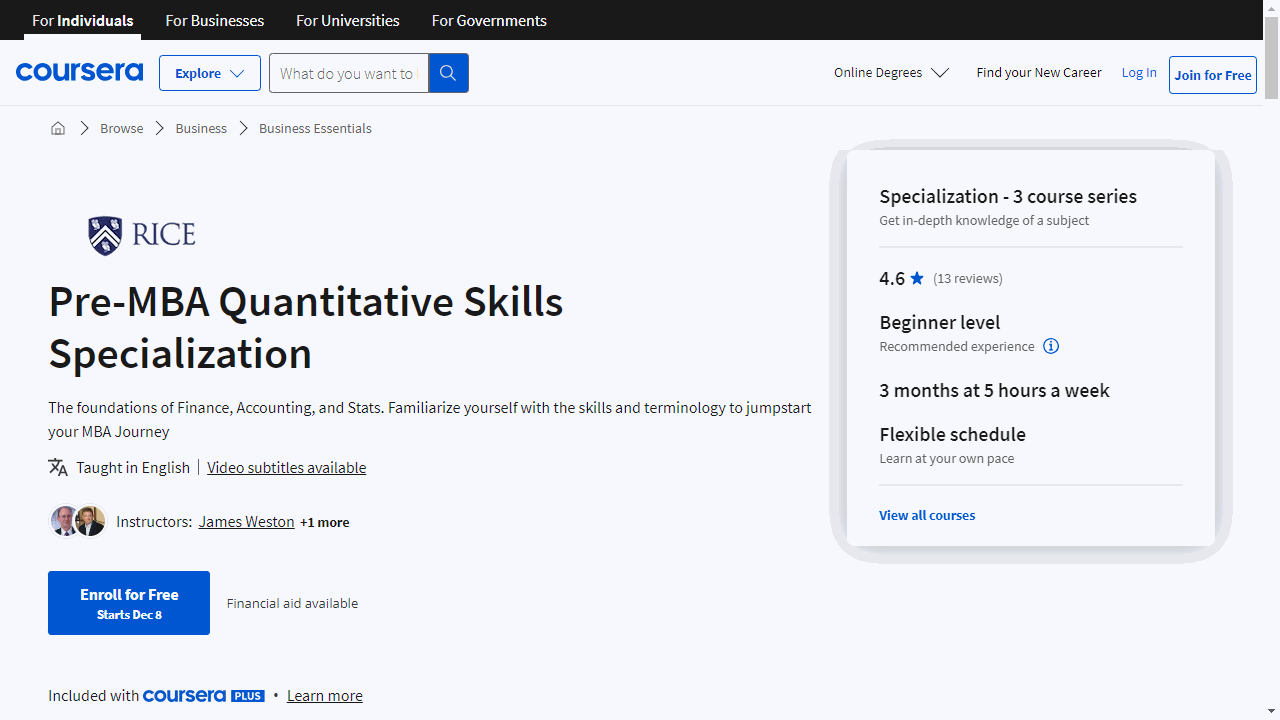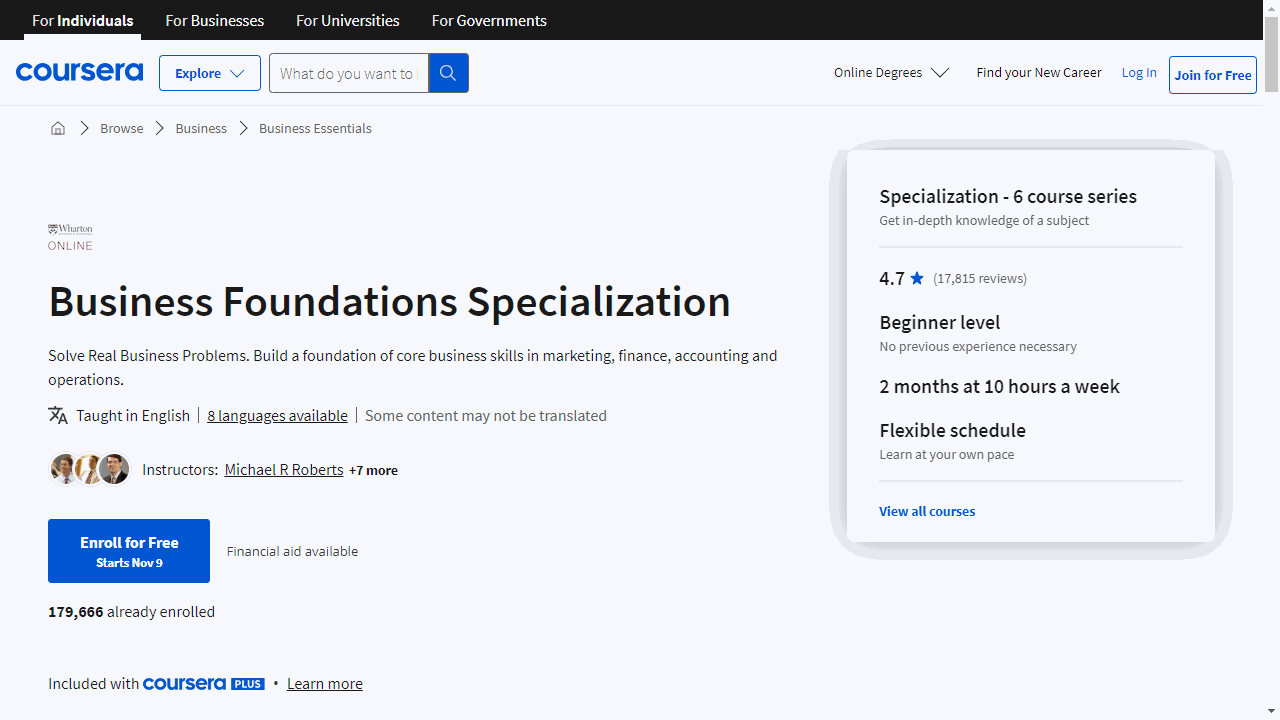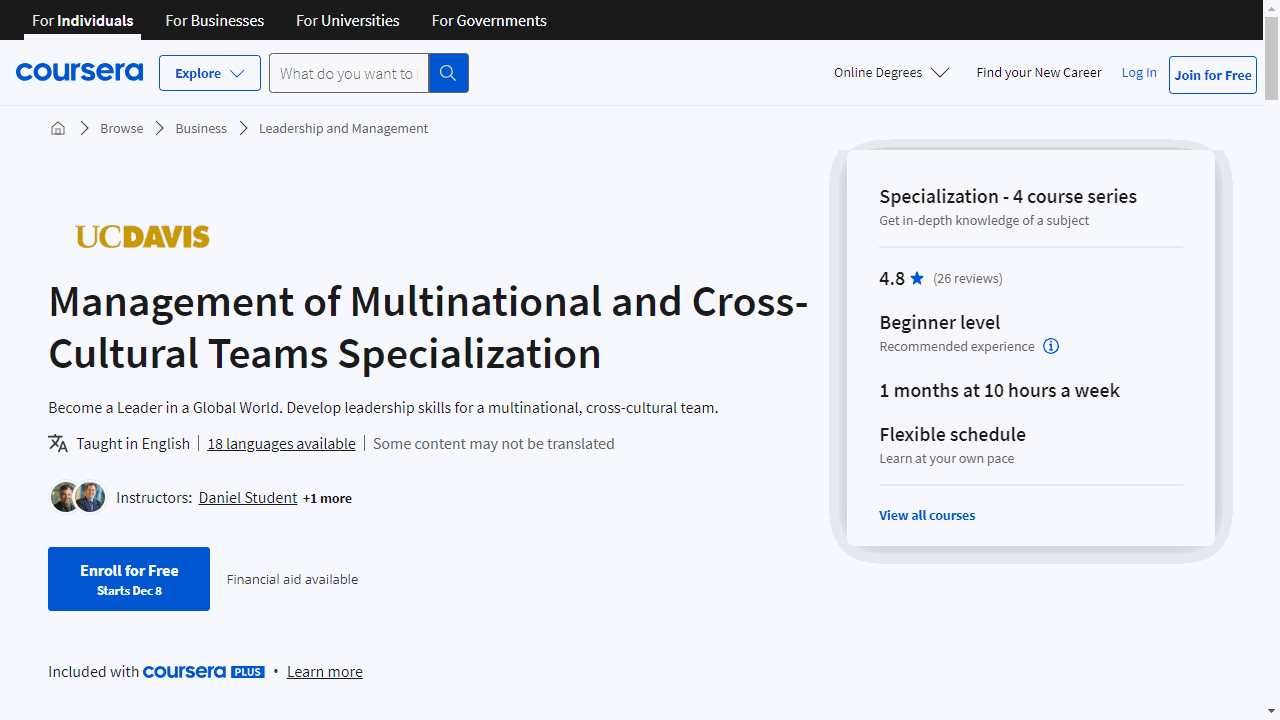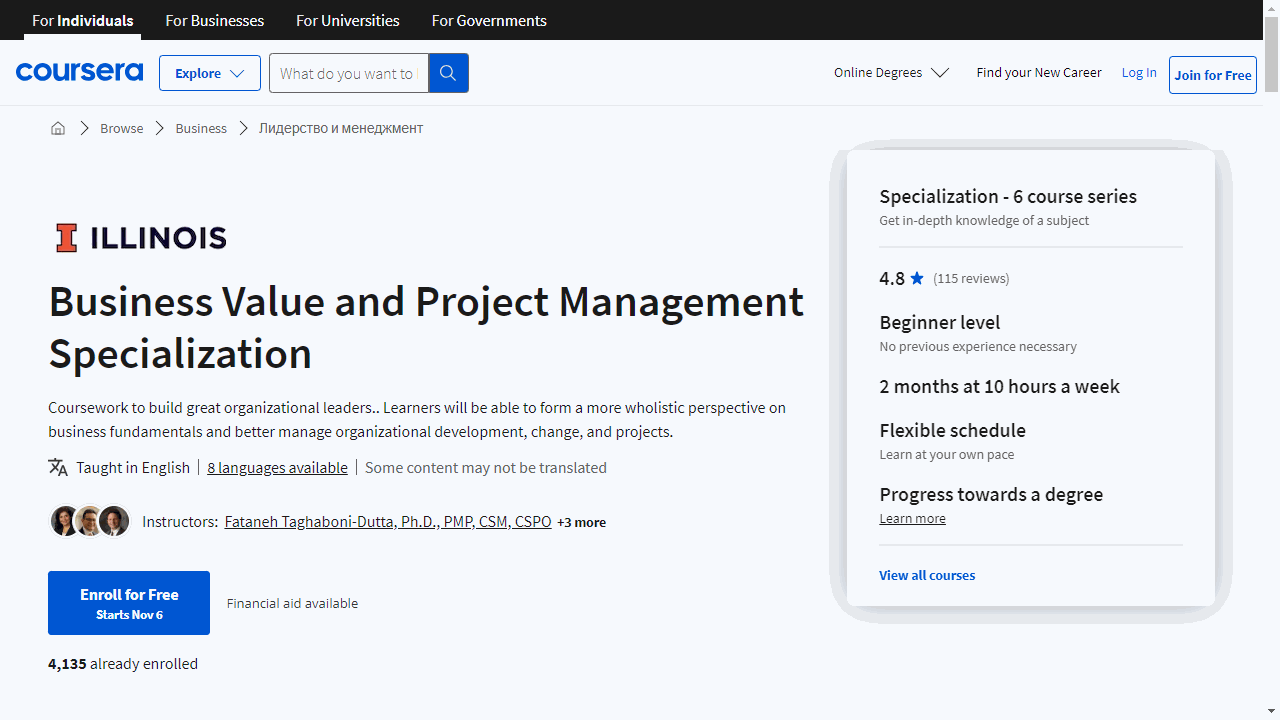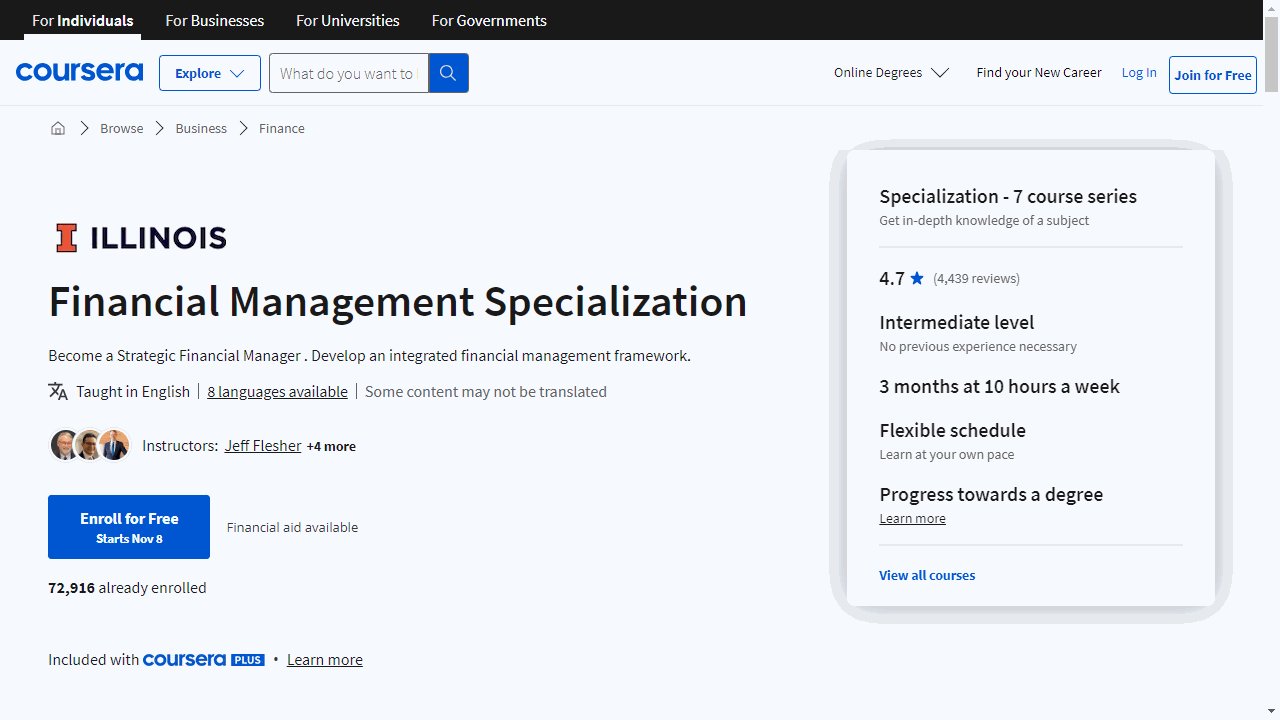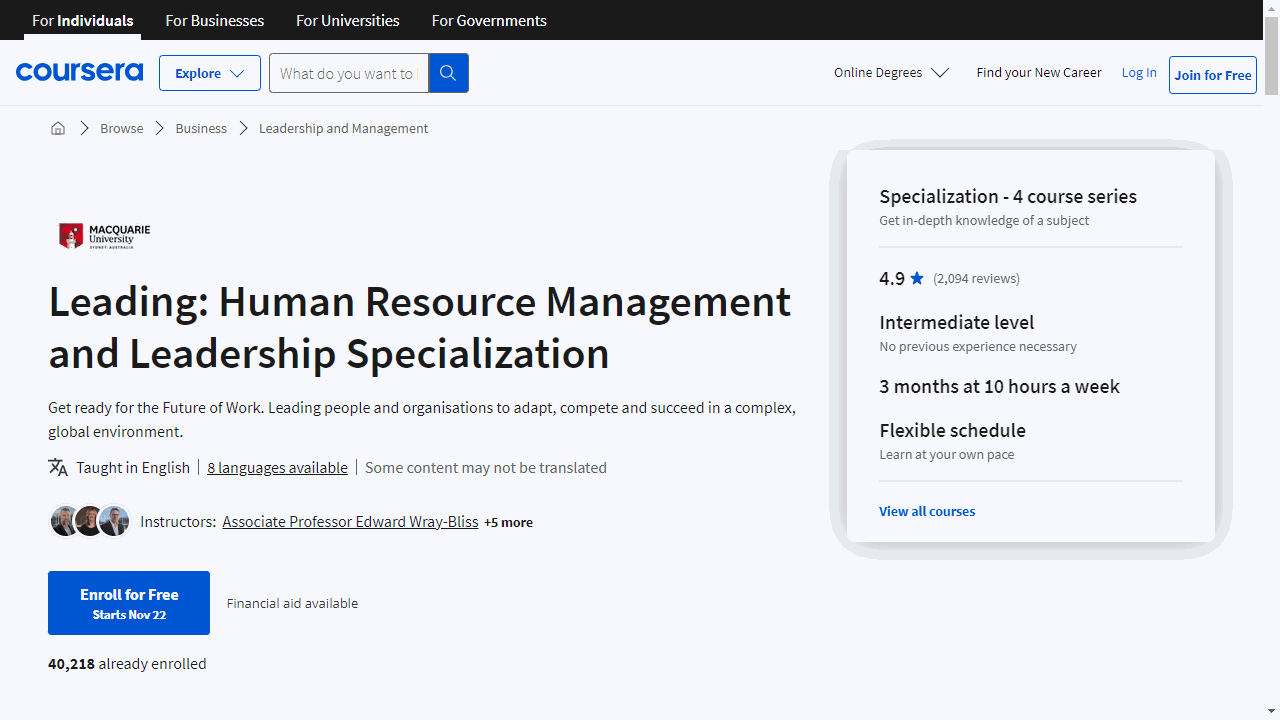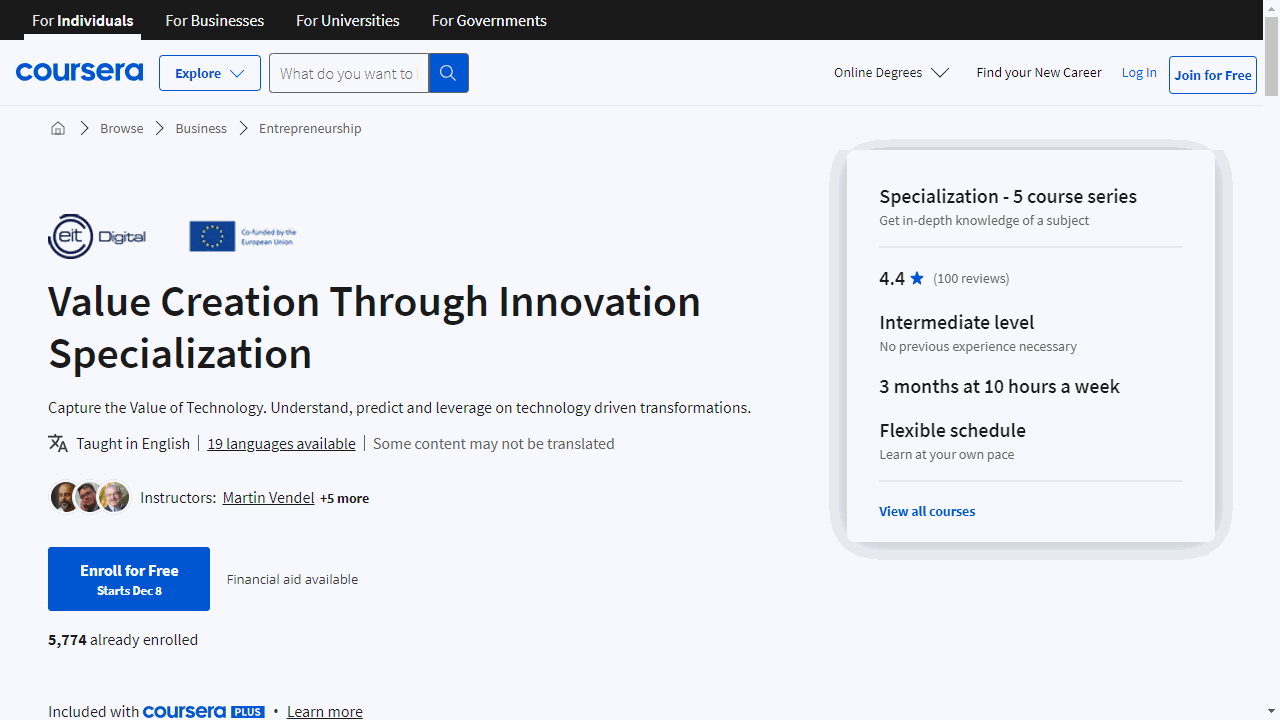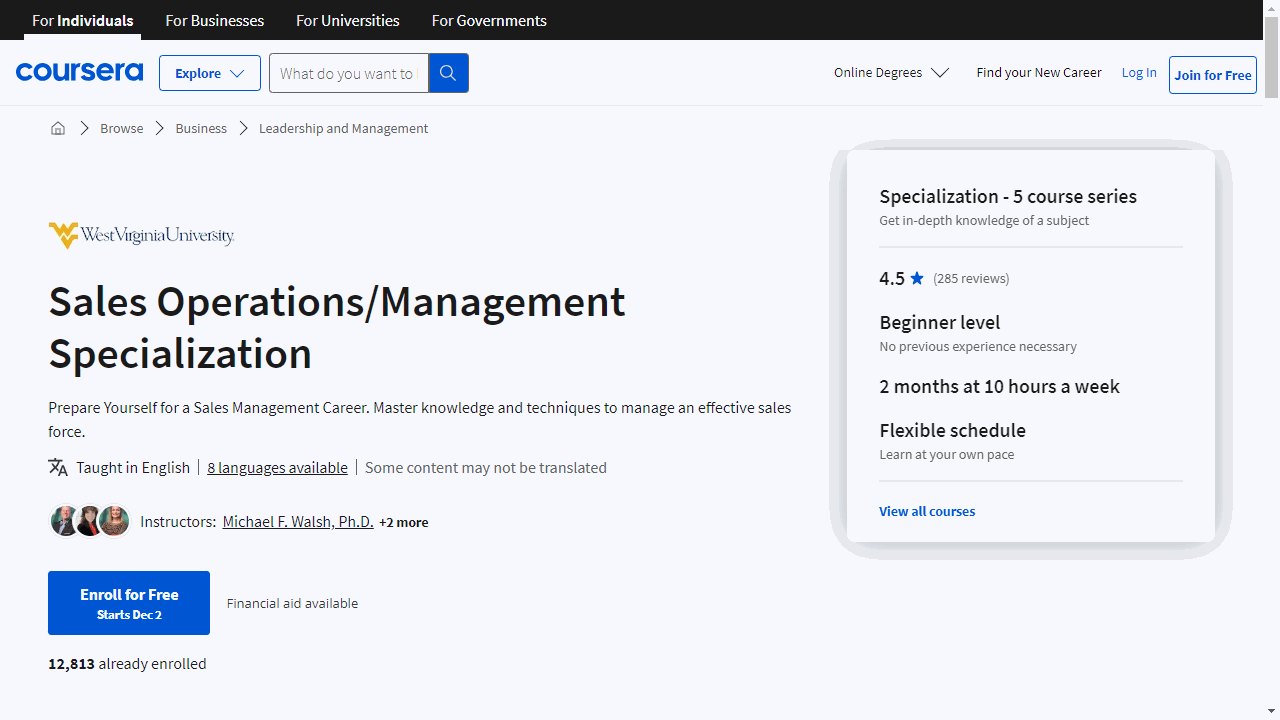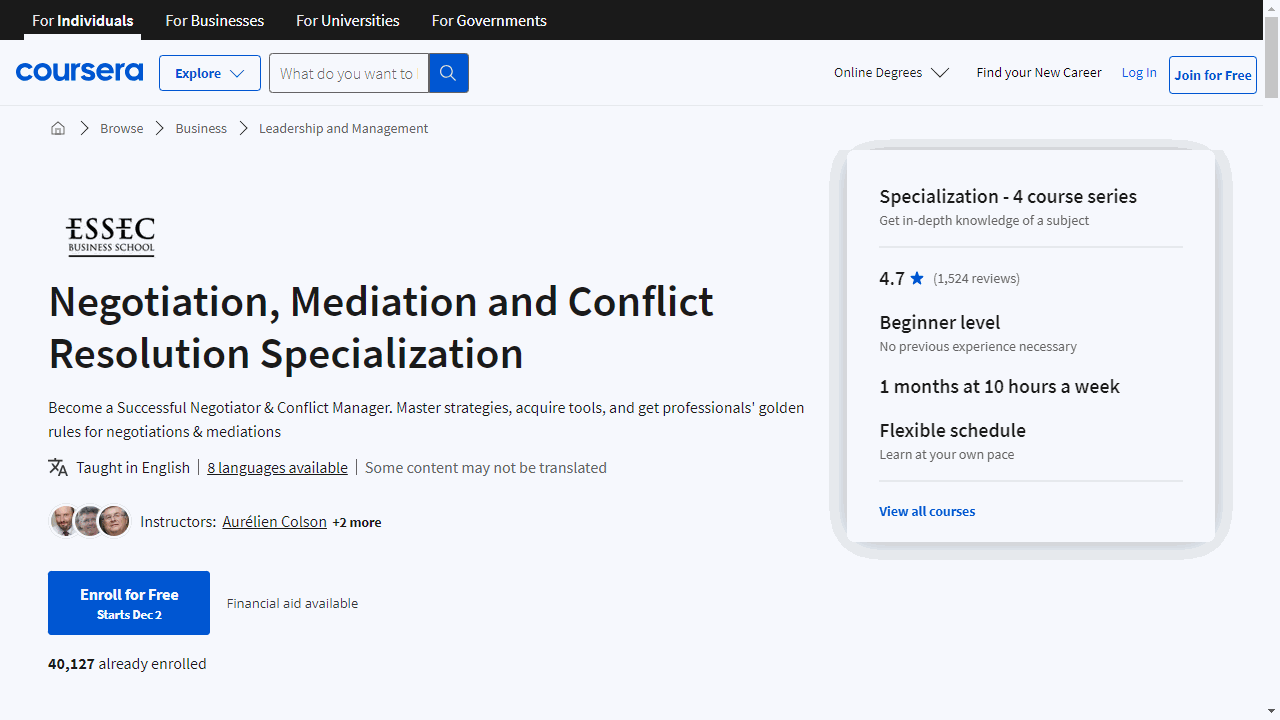An MBA (Master of Business Administration) is a postgraduate degree designed to equip individuals with the knowledge, skills, and networks necessary to excel in the business world.
MBA programs delve into various disciplines, including finance, accounting, marketing, operations management, and leadership, providing a holistic understanding of business principles.
By completing an MBA, you can gain valuable credentials, enhance your career prospects, and acquire a strategic mindset to tackle complex business challenges.
Finding the right MBA course on Coursera can be a daunting task.
You’re looking for a program that delivers quality education, is affordable, and aligns with your specific career goals.
You want to be sure you’re getting your money’s worth and learning from reputable institutions.
For the best MBA course overall on Coursera, we recommend the Foundations of Management Specialization offered by IESE Business School.
This specialization is a comprehensive program that covers key management principles, providing a solid foundation for anyone looking to advance their career in the business world.
It features a practical approach, focusing on applying knowledge to real-world scenarios, and is taught by renowned experts in the field of management.
While this is our top recommendation, Coursera offers a wide array of MBA-related courses and specializations.
Keep reading to explore other options, including programs tailored for specific business areas, those focusing on leadership development, and even courses that prepare you for a career in a particular industry.
Foundations of Management Specialization
This specialization by IESE Business School packs practical knowledge and skills to elevate your management game.
You’ll be guided by the expertise of management thinkers like Peter Drucker, ensuring you’re learning from the best.
Dive into “Accounting: Principles of Financial Accounting” to decode the language of business.
You’ll learn to read and interpret financial statements, essential for making informed decisions.
With a focus on Dupont Analysis, Management Accounting, and Business Analysis, you’ll be equipped to interact confidently with financial professionals.
“Finance for Managers” goes beyond the basics, teaching you to uncover the stories behind balance sheets and income statements.
You’ll grasp how managerial decisions ripple through a company’s finances, and you’ll develop skills in Management Styles and Organizational Culture that are vital for leadership.
In “Marketing: Customer Needs and Wants,” you’ll get inside the minds of your customers.
This course covers marketing fundamentals, product pricing, channel decisions, and brand building.
You’ll also refine your communication strategy to effectively reach and engage your audience.
“Organizational Behavior: How to Manage People” offers insights into what motivates individuals and teams.
You’ll explore leadership, teamwork, and the impact of organizational and national cultures on workplace dynamics.
This course is your key to managing people with empathy and effectiveness.
Finally, “Analysis of Business Problems” challenges you to apply your new skills to a real-world scenario faced by GAS GAS, an off-road motorcycle manufacturer.
You’ll learn a robust six-step methodology to dissect business problems, integrating insights from accounting, finance, marketing, and organizational behavior to drive positive outcomes.
Each course is a building block, helping you understand key entities like balance sheets, income statements, and organizational culture.
International Business Essentials Specialization
This specialization is offered by the University of London.
It begins with “Professional Skills for International Business,” where you’ll hone the essential soft skills that make a lasting impact in any professional setting.
From crafting a compelling personal brand to mastering the nuances of effective leadership and time management, this course lays the groundwork for your ascent in the business world.
As you progress to “Management Skills for International Business,” the focus shifts to the intricacies of leadership versus management.
Here, you’ll delve into what truly motivates teams and learn how to foster productive relationships, setting you apart as a leader who not only manages but inspires.
For those with an affinity for numbers, “Quantitative Foundations for International Business” strengthens your mathematical foundation, a critical aspect for anyone aiming to excel in finance or economics.
The course offers a practical approach to complex concepts, ensuring you’re well-prepared for analytical challenges.
Complementing this is “Statistics for International Business,” which demystifies the process of interpreting data to make informed decisions.
Understanding probability and statistical estimation becomes second nature, empowering you to navigate the data-centric aspects of modern business with ease.
To contextualize your newfound skills, “International Business Environment” provides a strategic lens through which to view the global market.
You’ll explore various analytical frameworks, such as PESTLE and SWOT, to assess and adapt to the ever-changing international business landscape.
Culminating the specialization is the “International Business Capstone,” a practical application of all the knowledge you’ve accumulated.
This project simulates real-world business challenges, allowing you to craft a comprehensive business plan that could serve as a cornerstone for your future endeavors.
Each course not only contributes to your professional development but also serves as a potential stepping stone towards the University of London’s Global MBA program.
Pre-MBA Quantitative Skills Specialization
This specialization by Rice University sharpens your business skills before diving into an MBA.
It equips you with the critical quantitative abilities that are the cornerstone of MBA success.
In “Pre-MBA Quantitative Skills: Finance,” you’ll explore the essentials of financial decision-making without getting bogged down by complexity.
You’ll grasp concepts like the time value of money and discounted cash flow (DCF) valuation, and understand how these principles drive corporate finance and stock market investments.
This course is perfect if you’re new to finance or aiming to solidify your understanding before pursuing an MBA.
“Pre-MBA Quantitative Skills: Accounting” demystifies the financial statements that are the pulse of any business.
You’ll learn to interpret balance sheets, income statements, cash flow statements, and statements of stockholders equity.
With a focus on the accounting equation and transaction recording, this course lays a robust foundation for future financial accounting studies, whether you’re starting from zero or refreshing your knowledge.
Finally, “Pre-MBA Quantitative Skills: Data Analysis” revives your math and statistics skills through practical, real-world applications.
You’ll become adept at using Excel for modeling and analysis, preparing you to tackle quantitative business challenges with confidence.
This course is accessible to all, regardless of your previous experience with spreadsheets or data analysis.
Each course in this specialization is a step toward mastering the quantitative aspects of business.
With no prerequisites required, you can jump right in and start learning from Rice University’s experts.
Plus, if you’ve previously engaged with similar content, like “Finance for Non-Financial Professionals,” your progress will seamlessly integrate into this specialization.
Wharton Business Foundations Specialization
This specialization by Wharton from the University of Pennsylvania is a classic choice for anyone looking to build a solid foundation in business.
Taken by more than 100,000 learners, it’s a comprehensive learning path that covers key areas such as marketing, finance, and operations management.
Take “Introduction to Marketing,” where you’re not just learning theories but also applying them.
This course, led by Wharton’s esteemed faculty, equips you with an understanding of branding that goes beyond logos to create lasting customer loyalty.
You’ll also explore customer centricity, which is all about truly understanding and meeting customer needs, and you’ll delve into effective go-to-market strategies that are tested before you invest.
When it comes to the numbers, “Introduction to Financial Accounting” has you covered.
It demystifies financial statements, teaching you to read and analyze them with confidence.
This skill is crucial for anyone looking to make informed financial decisions, and the course’s practical approach means you’ll be able to apply what you learn to actual business scenarios.
Managing people is often cited as one of the most challenging aspects of business, but “Managing Social and Human Capital” provides valuable insights into this complex area.
Learn how to motivate and reward performance, design jobs for high productivity, and make timely management decisions.
This course offers tools for building a thriving organizational culture.
For those interested in the financial underpinnings of a company, “Introduction to Corporate Finance” introduces key concepts such as the time value of money and risk-return tradeoff.
You’ll see how these ideas play out in various scenarios, from personal finance to corporate decision-making, making the content relevant and applicable.
Efficiency is key in business, and “Introduction to Operations Management” focuses on streamlining processes to improve performance.
You’ll learn to identify bottlenecks, implement process improvements, and manage variability.
The course is hands-on, with practical exercises that translate to real-world benefits.
Finally, the “Wharton Business Foundations Capstone” allows you to apply your cumulative knowledge to challenges from established companies.
This project-based course is a chance to synthesize what you’ve learned and demonstrate your ability to think strategically and offer viable solutions.
Overall, the Business Foundations Specialization offers a comprehensive learning experience that balances theoretical knowledge with practical application.
It’s an investment in your business acumen that promises to pay dividends in your professional journey.
Management of Multinational and Cross-Cultural Teams Specialization
This specialization offered by University of California, Davis equips you with the tools to lead diverse teams effectively.
You’ll gain critical skills in culture, bias awareness, team management, and cross-cultural communication.
Dive into “Introduction to Multinational and Cross-Cultural Teams” and grasp how culture influences work dynamics.
You’ll learn to navigate cultural challenges and leverage them to enhance team performance.
This course is your first step in understanding the nuances of managing across borders.
“Cross-Cultural Communication and Management” goes beyond language, focusing on how your words and actions are perceived across different cultures.
You’ll identify your communication style and learn to merge cultural norms, fostering a cohesive team environment.
With “Cross-Cultural Virtual Spaces and Teams,” you’ll tackle the unique challenges of remote collaboration.
From mastering video conferencing to navigating the complexities of virtual work across time zones, this course prepares you to excel in the digital workplace.
Finally, “Leadership in Multinational, Cross-Cultural Teams” propels you into a leadership role, where you’ll explore how cultural expectations shape leadership styles.
You’ll adapt and innovate, preparing for future shifts in technology and climate change that impact multinational team dynamics.
Business Value and Project Management Specialization
This specialization by the University of Illinois at Urbana-Champaign mixes project management with business fundamentals.
You’ll start by building a foundation in financial accounting.
The two accounting courses teach you to record financial transactions, analyze statements, and understand accounting methods.
Gaining this financial literacy will help you manage budgets and assess project costs.
Then you’ll learn how to design effective, agile organizations.
Courses on organizational structure and management provide frameworks to strategically plan governance, facilitate change, and resolve common managerial challenges.
Useful when navigating the organizational side of projects.
The final two courses focus specifically on project management.
You’ll discover traditional and agile approaches to initiating and planning successful projects. Key frameworks provide the flexibility to choose the right approach for each project.
The second PM course covers executing projects and tracking progress - critical skills for delivering projects on time and budget.
Financial Management Specialization
Navigating the world of finance requires a solid foundation, and the “Financial Management Specialization” on Coursera, backed by the University of Illinois, offers a structured path to acquiring this expertise.
Begin with “Financial Accounting: Foundations,” where you’ll get to grips with the core principles of financial accounting.
This isn’t just about memorizing terms; it’s about understanding the significance of financial statements and how transactions shape the financial narrative of a business.
Building on that foundation, “Financial Accounting: Advanced Topics” delves into the complexities of asset and liability accounting, equity, and the all-important cash flows statement.
This course equips you with the analytical tools to assess a company’s financial health beyond the surface numbers.
For those interested in the dynamics of the stock market, “Investments I: Fundamentals of Performance Evaluation” introduces you to the interplay between risk and return.
You’ll learn to use models like CAPM for investment evaluation, all while honing practical Excel skills that are indispensable in the finance industry.
“Investments II: Lessons and Applications for Investors” continues your investment education, offering insights into the behaviors that drive investor decisions and the performance of mutual funds.
This course provides a deeper understanding of how to navigate and succeed in the investment landscape.
Shifting focus to corporate finance, “Corporate Finance I: Measuring and Promoting Value Creation” teaches you how to use financial information to drive value creation within a company.
From liquidity management to investment evaluation, you’ll learn to make decisions that align with shareholder interests.
“Corporate Finance II: Financing Investments and Managing Risk” addresses the strategic side of finance, including how companies manage debt, equity, and financial risk.
You’ll explore the intricacies of financial instruments and how they can be used to maintain a firm’s financial stability.
The capstone project is where theory meets practice.
You’ll synthesize the knowledge from each course to develop a comprehensive financial management plan, showcasing your ability to apply your learning to real-world scenarios.
Each course in this specialization is designed to build upon the last, ensuring a progressive learning experience.
You’ll gain a well-rounded skill set in corporate finance, risk management, and investment strategy. And as part of the iMBA program, these courses offer a taste of an MBA education at a fraction of the cost.
Leading: Human Resource Management and Leadership Specialization
Offered by Macquarie University.
This set of courses is designed to equip you with the skills needed to navigate the complexities of modern organizations and lead with confidence.
In “Organisational design: Know your organisation,” you’ll delve into the essentials of how organizations function in today’s competitive environment.
This course isn’t just about theory; it’s about application.
You’ll learn to identify and align your organization’s capabilities with its strategic goals, pinpoint areas where your organization isn’t quite hitting the mark, and develop actionable plans to address these gaps.
Moving on to “Organisational behaviour: Know your people,” you’ll gain insights into the most valuable asset of any organization—its people.
This course covers the spectrum of personnel management, from understanding individual differences to leveraging workplace diversity.
You’ll explore how to motivate your team and optimize team dynamics for peak performance.
With “Adapt your leadership style,” the focus shifts to you, the leader.
It’s about understanding the evolving landscape of leadership and how to adjust your approach to meet these changes.
You’ll examine different leadership theories, understand the need for flexibility in your leadership style, and learn how to foster a culture of participation and self-organization.
Finally, “Visionary leadership, identity & motivation: Become a meaning maker” takes you on a journey to becoming a leader who not only has a vision but knows how to make it resonate.
This course will help you understand the role of meaning in work and how to communicate your vision effectively.
You’ll also learn to build a brand identity that supports and amplifies your leadership goals.
Each course is packed with practical learning activities, from video lectures to quizzes and discussions, all designed to help you apply what you’ve learned directly to your work environment.
By completing this specialization, you’ll come away with a robust set of skills in organizational design, behavior, and leadership.
You’ll be prepared to make informed decisions, manage diverse teams, adapt your leadership style, and create a vision that inspires those around you.
Value Creation Through Innovation Specialization
This specialization by EIT Digital is a powerhouse of knowledge, combining the expertise of UC Berkeley’s Haas School of Business and KTH Royal Institute of Technology.
Kick off with “The Impact of Technology” to grasp how tech shapes our world.
You’ll learn to forecast tech impacts, understand social and economic shifts, and use history to spot trends.
This isn’t just theory; it’s a strategic guide to the future of business.
Move on to “Innovation & Entrepreneurship - From Basics to Open Innovation,” where you’ll adopt a Silicon Valley mindset.
Discover the building blocks of innovation, the significance of learning from failures, and the essentials of customer engagement.
It’s a deep dive into making your business or idea flourish.
Then, “Innovation & Entrepreneurship - From Design Thinking to Funding” sharpens your skills further.
Here, you’ll explore the full innovation cycle, from design thinking to securing the funds to bring your vision to life.
With a focus on the IT sector, this course is practical and forward-thinking.
“Marketing Strategy for Entrepreneurs” is all about action.
You’ll start with the challenge of cold calling and advance through customer segmentation, market strategy, and expansion.
This course is a hands-on guide to marketing, especially for tech-driven businesses.
Finally, the “Capstone Value Creation through Innovation” is where you prove your mettle.
Apply everything you’ve learned to a project you’re passionate about.
This capstone isn’t just about completing tasks; it’s about strategically applying methods to real-world scenarios.
By the end of this specialization, you’ll have honed skills in sales, marketing, digital marketing, and entrepreneurship.
You’ll be equipped to identify and seize tech opportunities, ready to innovate and lead in the digital era.
Sales Operations/Management Specialization
This comprehensive program from West Virginia University equips you with the essential skills for a career in sales management.
Start with “Account Management & Sales Force Design” to grasp various sales methods, strategic planning, and the role of a sales manager.
You’ll understand the sales process and the dynamics of a buying center, where key purchasing decisions are made.
In “Sales Force Management,” you’ll learn to attract and retain stellar sales talent.
Discover effective job design, recruitment strategies, and the importance of training.
You’ll also explore motivational techniques to drive your team’s performance.
The course “Compensation, Expenses and Quotas” delves into the financial side of sales management.
You’ll navigate through compensation models, manage sales expenses wisely, and set quotas that challenge and encourage your sales force to excel.
“Forecasting, Budgeting, Territories, Evaluation and Legal/Ethical Issues” covers the analytical aspects of sales management.
You’ll learn to forecast sales, create sensible budgets, assign territories strategically, and evaluate your team’s performance, all while staying informed about legal and ethical standards.
Cap off your learning with the “Sales Operations: Final Project,” where you’ll apply your knowledge to analyze a real business’s sales operations and interview a Sales Manager to gain insights into practical sales management practices.
Negotiation, Mediation and Conflict Resolution Specialization
This specialization is offered by the ESSEC Business School, a top-ranked French business school.
In “Negotiation Fundamentals,” you’ll acquire practical tools to prepare for negotiations, structure effective sequences, and navigate through deadlocks.
This course emphasizes creating sustainable partnerships, moving beyond a win-lose mindset to achieve mutually beneficial outcomes.
“International and Cross-Cultural Negotiation” takes you across the globe, enhancing your understanding of cultural impacts on negotiation.
You’ll learn to recognize and adapt to cultural nuances, improving your negotiation flexibility and strategy when dealing with international partners.
“Mediation and Conflict Resolution” equips you with the skills to lead mediation processes and resolve workplace or international conflicts.
It builds on negotiation fundamentals, introducing you to various mediation types and strategies to address common challenges.
The capstone project is where theory meets practice.
You’ll analyze real-life negotiations, engage in peer negotiations, and simulate mediation scenarios.
This hands-on approach solidifies your learning and prepares you for real-world application.
Each course is rich with expert videos, interactive content, and practical case studies, ensuring a comprehensive learning experience.
